Alexey and Henk, the friends who took Tetris out of the Soviet Union
We spoke with the unlikely partners Alexey Pajitnov and Henk Rogers about the challenges they overcame to get the video game marketed beyond the Berlin Wall. Their adventure inspired a movie and forged a relationship that endures four decades and 520 million games later

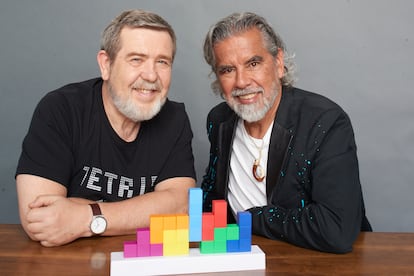
One man invented a video game that has sold more than 520 million copies. The other fought to obtain the rights to it during the Soviet era, got the game’s designer out from behind the iron curtain, and made it possible for half of humanity to dream of colored blocks just as the Berlin Wall was collapsing.
Alexey Pajitnov from Moscow and Henk Rogers from Amsterdam are partners in The Tetris Company, which celebrated the game’s 40th anniversary this year. But they are much more than that. They lived together in the Moscow of the late 1980s in a crazy adventure to wrest the Tetris distribution license from the jaws of both the hermetic Soviet bureaucracy and unbridled capitalism (the ill-fated media tycoon Robert Maxwell was distributing Tetris without a fully valid contract via Mirrorsoft) The odyssey inspired the entertaining thriller Tetris (2023, Apple TV+) and forged a complicit friendship.
Question: How would you define your relationship?
Alexey Pakhitnov. It’s his favorite topic, let him answer...
Henk Rogers. We are friends, although we could not be more different; Alexey likes classical music, I like rock. He likes planning, I like adventure. He is an introvert. I’m an extrovert... But if we are in the same city, a bottle of wine will be on the table.
A.P. It’s weird, this guy is part of my life.
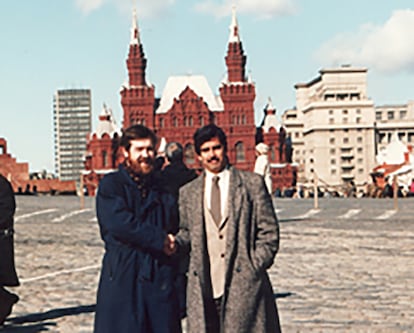
Q. What made you connect and trust each other?
A.P. We met in Moscow in 1989 at a negotiating table [at the offices of Elorg, a state-owned software export company]. I was the only game designer in the USSR, so Henk was my first colleague.
H.R. That doesn’t explain how we became friends! Okay, I was your first girlfriend, but we didn’t stay together because of that [both laugh]. I think the key to gaining his trust (and everyone else’s there) was my complete honesty about how the business works. What I said disarmed them.
A.P. It was a shock in the 1980s in the Soviet Union, where every capitalist was an enemy…
Q. And what did you, Henk, see in Alexey that made you risk everything, including mortgaging your home?
H.R. Firstly, the sheer genius of what he had created. And then his perseverance. He put up with an incredible amount of bullshit to get his game off the ground in a USSR that didn’t understand copyright and patents. In 1984, he entered a contest just to get on paper that Tetris was his. He came in second [laughs].
Q. When did you realize you had something iconic on your hands?
A.P. I was still working on the prototype ― I had the playing field, the generator, the falling pieces, but there was still no decoration, no scoreboard... I had been working on it for three weeks when I caught myself playing with the excuse that I was fixing a fault. But there was no fault, I just couldn’t stop playing.
H.R. I always thought the game would be a big hit, but when we started moving it around Japan, I only got orders for about 40,000 units. I needed to place at least 200,000. So I made an appointment with Mr. Yamauchi, the president of Nintendo. “I have the best game of all time, but I can’t sell it. Am I bad at marketing? What’s my problem?” Mr. Yamauchi called Mr. Miyamoto, creator of Mario, to test it and asked him if the game was any good. “Yes,” Mr Miyamoto said. “All the secretaries and accountants are playing it at lunchtime and that has never happened to us.”
Q. Yaumachi gave the game a financial boost, but the real success came when they released it alongside the new Game Boy handheld console. In the film, Henk is key to that decision....
H.R. Yes, in the film, they use the actual phrase I used at Nintendo: “If you want to sell the Game Boy to children, pack it with Mario; if you want to sell it to the whole world, do it with Tetris.”
Q. What did you think of the movie?
A.P. Surprisingly good. We were very involved in the script phase, we made a lot of changes, but we didn’t have any control during the shooting because of Covid and we were worried about that. But it’s very good, although it’s odd to see someone who looks like you acting out your life.
H.R. I was terrified but in the end I cried several times over things that never happened!
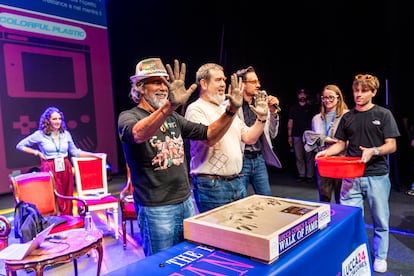
Q. The film ends when Alexey leaves the USSR and Henk is waiting for him at San Francisco airport. What would happen in the sequel?
H.R. After several complications Alexey started getting paid for Tetris in 1995. In the early 2000s, I started a mobile game company ― I knew mobile games were going to be a big hit. The video game publisher Jamdat offered me $25,000 to license Tetris. I told them no way, and a couple of years later, when they went public, they bought my company for over $67 million. Within a month of the sale, when I still hadn’t touched the money, I was in an ambulance on my way to hospital with a coronary artery blockage. A heart attack known as a widow maker. Ninety-five percent of those who have it die, but I survived and found a mission: to end fossil fuels. People think we’re screwed, I say we need to make a decision and fix the problem.
A.P. I had a pretty good career at Microsoft as a designer. I was there at the beginning of the Xbox, there were a lot of complications. I published five or six games... I’m proud. And now, I’m almost retired. I have several projects, but they’re going slowly... And I’m still having fun.
H.R. And you have written a novel!
A.P. Yes, it’s about a gang of young delinquents in the former Soviet Union, my favorite archetype.
H.R. I’m also writing a book, about what happened before and after the events narrated in the movie. It’s called The Perfect Game, From Russia with Love. It will be out in April.
Q. Is there something bittersweet about being remembered for one thing, or is that enough?
A.P. It’s good enough for me. At some point in my career I felt that having done Tetris limited my designs, that I needed to get over it... But now I’m at peace.
H.R. I don’t feel that Tetris defines me. Now I fight for climate change and, in that world, I am gaining notoriety. I live in Hawaii where I work for 100% renewable energy. Tetris is not my last gig..
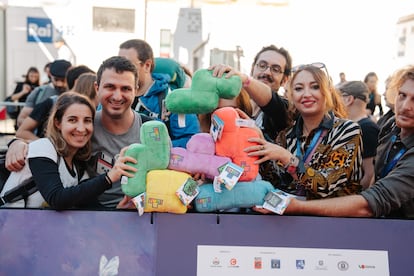
Q. How much has the industry changed? Could something that starts so small still conquer the world?
A.P. Unfortunately, everything is now moving very fast and developers are not precise or careful. There is so much competition that a lot of garbage is being produced. It’s a pity, but given such a large number of titles, every so often one comes along that changes the industry.
H.R. I think it happens all the time. Look at Minecraft, a game that doesn’t look like any other. It started as something small and boom boom boom, it became huge. And well, I also like a very silly little game called Wordle....
Q. You and millions of others. Amazing, given it was created by a guy in his house during lockdown.
H.R. And although it’s based on other games, like Mastermind, it’s a very pure game. I play it with a group of friends, the same ones who play Catan [board game]. We accumulate Wordle points weekly and whoever wins gets to add a new rule to Catan.
Q. Wow, you’re quite a gamer.
H.R. Definitely.
Q. What about you, Alexey?
A.P. I do a lot of puzzles. I’m more of a mathematician. I like puzzles, finding the mystery behind the numbers and things like that.
Q. And do you still play tennis? [Tetris is a combination of tetra, which means four in Greek, and tennis, the designer’s favorite sport].
A.P. I’m too old, don’t even remind me.
Q. And Tetris?
A.P. Sometimes for fun.
H.R. Only if I have to try something for work..
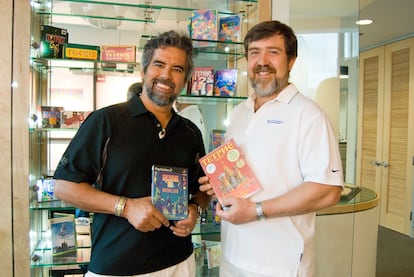
Q. What if you play together?
A. P. He is more aggressive. And much better.
Q. What do you think of other video games, for example, Super Mario?
H.R. Great game. I’ve played it to the end.
A.P. Not my thing, but I’ve played it a lot.
Q. Candy Crush?
A.P. It’s a copy of Bejeweled, which in turn, was based on a prototype called Breakthrough...
H.R. Some poor sap made the original and never got anything out of it because there is a copy of a copy of a copy of a copy...
A.P. Bejeweled pissed me off so much that I made my own version. It was a great idea done in a very sloppy way. It was a crap piece of work. My version, Hexic, was a good game, I still get royalties from it. About $35 a month [laughs].
Q. Minecraft?
A.P. Incredibly interesting. A phenomenon in the industry. I’ve spent months playing it.
H.R. It’s gold.
Q. The survival game Fortnite?
A.P. I’m not familiar with it.
H.R. Neither am I, but when I started designing games, I made a decision never to make a game I wouldn’t want my kids to play. A very simple rule.
Q. Do you feel guilty for the time you have wasted on Tetris?
H.R. Tetris involves a series of decisions every few seconds, while in life you do many things automatically, you get up, have breakfast, go to work.... Just as I would not feel guilty for putting you on a treadmill to improve your health, I do not feel guilty for exercising your mind.
A.P. That time you lost... did you have a good time or a bad time? If you had a good time, rather than stealing your time, I gave it to you as a gift.
Sign up for our weekly newsletter to get more English-language news coverage from EL PAÍS USA Edition
Tu suscripción se está usando en otro dispositivo
¿Quieres añadir otro usuario a tu suscripción?
Si continúas leyendo en este dispositivo, no se podrá leer en el otro.
FlechaTu suscripción se está usando en otro dispositivo y solo puedes acceder a EL PAÍS desde un dispositivo a la vez.
Si quieres compartir tu cuenta, cambia tu suscripción a la modalidad Premium, así podrás añadir otro usuario. Cada uno accederá con su propia cuenta de email, lo que os permitirá personalizar vuestra experiencia en EL PAÍS.
¿Tienes una suscripción de empresa? Accede aquí para contratar más cuentas.
En el caso de no saber quién está usando tu cuenta, te recomendamos cambiar tu contraseña aquí.
Si decides continuar compartiendo tu cuenta, este mensaje se mostrará en tu dispositivo y en el de la otra persona que está usando tu cuenta de forma indefinida, afectando a tu experiencia de lectura. Puedes consultar aquí los términos y condiciones de la suscripción digital.








































